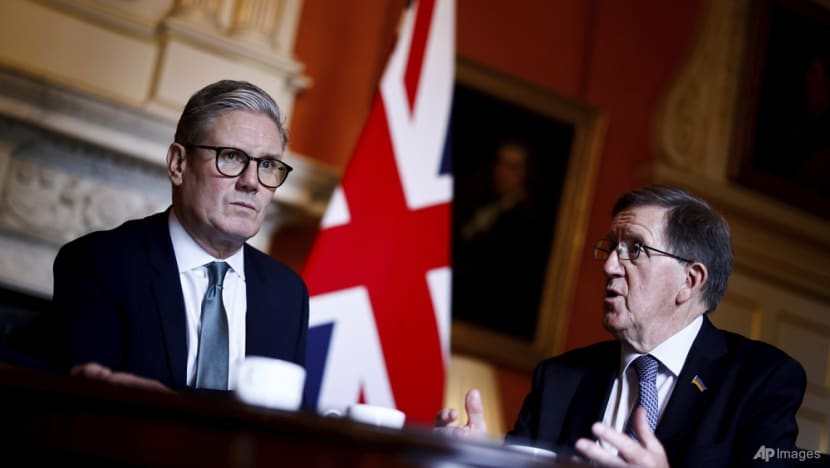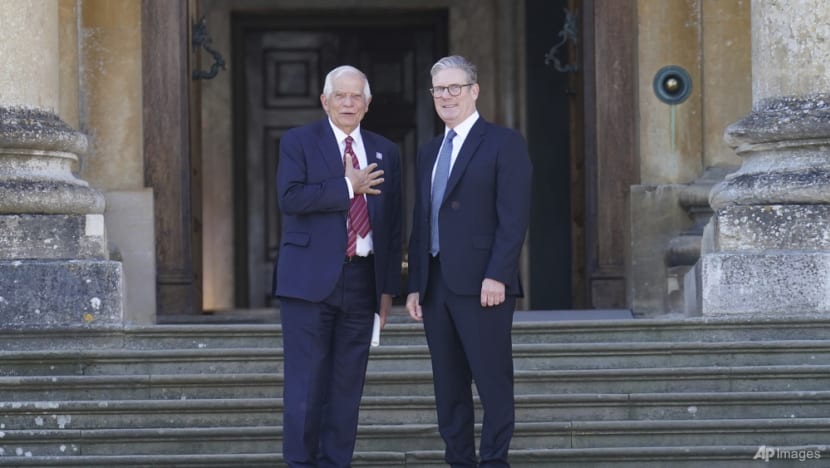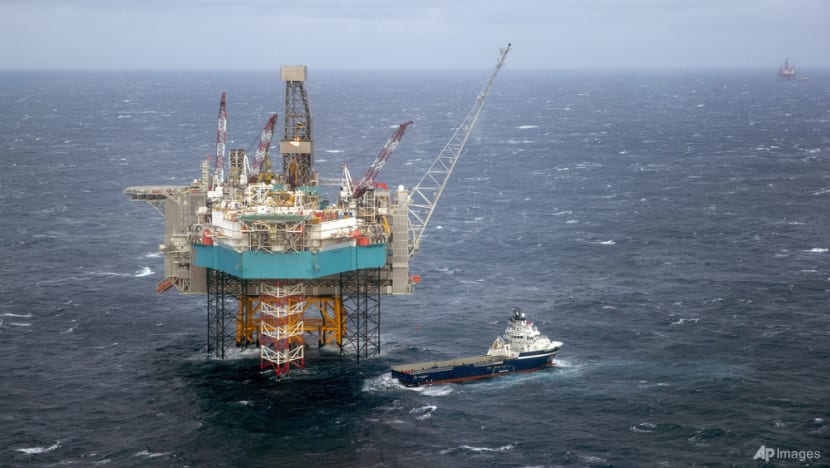From defence to EU relations, what do policy changes under UK’s new government look like?
CNA looks at three of Britain’s policy changes after the Labour Party won the general election by a landslide last month, replacing a Conservative government that was in power for 14 years.


This audio is generated by an AI tool.
LONDON / BRISTOL: British Prime Minister Keir Starmer has been in office for over a month after the Labour Party won a landslide election victory, forming a government for the first time in 14 years.
From a review of the United Kingdom’s armed forces to a pause on issuing new oil and gas licences, the new left-wing government is swiftly putting its stamp on several policies.
Starmer has also said he wants to reset the UK’s relationship with the European Union, and improve on the Brexit deal reached by his predecessors.
After almost a decade of fractious negotiations, however, getting concessions on that front may prove more difficult than expected.
CNA looks at how three of Britain’s policies have changed under the new government.
Related:
UK-EU RELATIONS
The UK officially left the EU on Jan 31, 2020 after voting to do so in 2016.
It was the latest twist in the country’s relations with Europe, which have been a constant topic of fierce debate in British politics since the UK joined the European Communities in 1973 – one of the EU’s three pillars back then.
Now, the Starmer government is looking to build a closer relationship with Brussels in areas like trade, education, research and security.
Among the deals it would like to strike with the EU is a security pact, given that both sides are aligned on security issues.
Another plausible deal involves education and youth mobility, such as including the UK in the bloc’s Erasmus Study Abroad programme, which offers university students the opportunity to study or do an internship abroad in a partner country.

However, other parts of the anticipated reset will be tougher.
Migration has become the top political hot-button issue in Europe. While the UK wants a deal on stopping small boats in the English Channel, the EU seems to have limited interest in striking one.
The number of refugees and migrants entering the UK illegally by crossing the Channel has risen in recent years, with more doing so on small boats since 2018.
As for the big issue of trade, the Starmer government wants to ease customs checks at Europe’s borders and align some of the UK’s standards to the EU’s in hopes of getting a new and better trade deal.
However, Brussels has so far shown reluctance to re-enter yet another round of lengthy negotiations.
European officials have made it clear that the UK should focus on implementing the deals it already struck with Brussels before trying to strike new ones.
Experts cautioned that it could take months of careful diplomacy with European diplomats, who remain bruised from years of tense Brexit talks, to turn good intentions into concrete action and lasting change, they added.
“If the policy issues are lower key – (for example) if it's about standards in terms of veterinary science or regulations for agricultural standards – that should be fairly straightforward, because the public would not mind concessions on sort of issues that are perceived to be technocratic,” said Denny Pencheva, European politics and public policy lecturer at University College London.
While Starmer could have more luck with individual EU members, Pencheva said it could still prove tricky to negotiate with countries like France.
The thorny issue of small boat crossings has long been a source of tension on either side of the English Channel.
“How ever much money the UK throws at France is nowhere near enough in terms of policing costs for the French government,” Pencheva noted.
“Also, politically, with the right-wing shift in French politics, there is really little upside to be doing policing on account of the UK,” she added.
ARMED FORCES REVIEW
In terms of the country’s armed forces, one of the government’s first actions since winning July’s general election was to launch a “root and branch review” to prepare the UK for a more volatile world.
The review will not produce any reports until the first half of next year, but some experts and prominent ex-members of the armed forces have warned there are no easy solutions.
Without significant investment, they said the UK will need to step back from its role in global defence.
To address this, Starmer has promised a “cast-iron” commitment to spend 2.5 per cent of the UK’s gross domestic product on defence and to maintain its nuclear capability, despite a tight squeeze on public spending.
In his first foreign trip as prime minister, he reaffirmed the UK’s “unshakable support” for the North Atlantic Treaty Organization (NATO) – an intergovernmental military alliance of 32 member states which the UK is a part of.
This comes as the number of British army personnel has fallen from more than 500,000 in the early 1980s to just under 140,000 currently.
In January, the head of the United States Navy called on Britain to reassess the size of its armed forces to better respond to global threats.
Former UK defence secretary Ben Wallace said then that the armed forces had been “hollowed out” and “underfunded” for more than a decade.
New defence secretary John Healey told parliament he is fully aware of the scale of the task, especially with ongoing wars and increasing global threats.
“We know, here too, there are serious problems. Morale is at record lows, alongside dreadful military housing and a defence procurement system that the Public Accounts Committee has described as ‘broken’ and wasting taxpayers’ money,” he added.
“We can't solve those problems all at once, but we are determined to fix them.”
While those in the defence industry – which supports about 85,000 full-time jobs – welcomed the commitment to increase spending on the sector, they stressed the need for greater collaboration in uncertain times.
“A more sustainable and safe future for the uses of defence is critical,” said James Sizer, head of marketing at Element Materials Technology.
“Partnership and collaboration, not just between private and public sector, but also between nations, is only going to go up on an upward trajectory.”
NO NEW OIL AND GAS LICENCES
Turning to another sector, the Labour government has ruled out issuing new licences for oil and gas projects in the North Sea.
This is a reversal of the previous Conservative government’s stance, which last year introduced legislation to allow oil and gas firms to bid for new licences to drill for fossil fuels every year.
The UK is aiming to reach net zero carbon emissions by 2050. Oil and gas extraction in the North Sea does not directly affect these goals as national targets only count what is burned, not what is produced.
Still, the government wants to transition from a fossil fuel-dominated energy industry to a “clean” one.
This signals a massive win for climate campaigners. However, oil and gas workers have voiced concerns about being made redundant.
Andy Shirreffs, a representative of Unite – the largest trade union representing offshore oil workers – told CNA that he fears many like him could experience mass redundancies like Britain’s coal miners did in the 1970s and 1980s.
This could leave behind the coastal communities of northeast England and Scotland that rely on offshore oil work.
The union is now calling for “no ban without a plan”.
“They talk about getting us into greener industries but they've no plan for how they're going to do that, how they're going to retrain us, where these vacancies are going to be, and what we're going to be doing,” said Shirreffs.
His suggestion: “Organise something for us. Tell us what you want. Tell us what we need, because these guys can do it.
“They're problem solvers; they’re guys who have gone offshore and know how to work a system, safety systems and all the training that they get. It would be very useful to have that, yet these guys could end up on the scrapheap,” he added.

Meanwhile, climate campaigners are pressing the new government to rescind oil and gas licences issued by the Conservatives before they lost the general election.
This was what the International Energy Agency called for in 2021, when it said governments that are serious about climate change should not issue new oil and gas licences.
The new Labour government has said it would not rescind licences as that would likely mean legal action from energy companies for breaking contracts. But campaigners want them to do it anyway.
"Look what the Labour government did in 1946,” said Sarah Lunnon, a supporter of British environmental activist group Just Stop Oil, drawing a parallel to the Labour government that took power right in the aftermath of World War II.
“They were given a mandate by a country that was in debt, that was traumatised, that had been bombed, and they did something remarkable – they supported the people. They protected the people. They brought in the welfare state, the NHS,” she added, referring to the National Health Service.
“That’s what we need this Government to do now: to start protecting us and to stop protecting the fossil fuel companies.”















